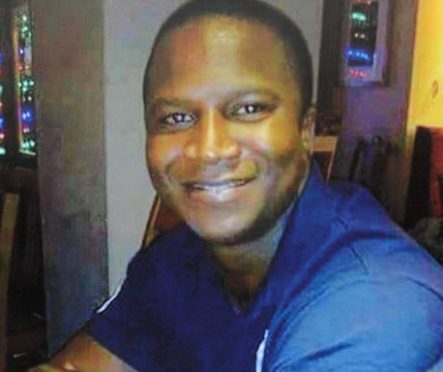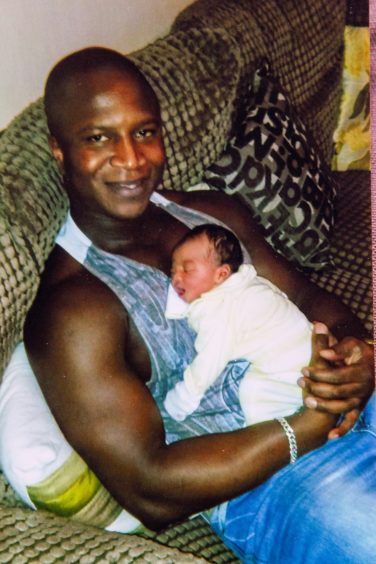
The family of a man who died in police custody face a decade without answers after it was revealed a public inquiry into his death is expected to last up to four years.
Sheku Bayoh died after being restrained by up to nine police officers in May 2015 but the Crown Office only decided last year that no one would be prosecuted. A public inquiry was subsequently announced into the circumstances of the death and whether race played a part.
Announcing the inquiry, Justice Minister Humza Yousaf said: “It is imperative that the circumstances leading up to Mr Bayoh’s death, and the events that followed, are examined in full and in public.”
However, a job advert relating to the inquiry, not expected to start for several months, has revealed officials expect it to take up to four years to conclude.
A Scottish Government advert for a media manager to handle the hearing’s press inquiries, with a salary of up to £46,599, states the inquiry “will be based in central Edinburgh and is expected to last around three to four years”.
We can also reveal the various groups involved, including police and the Crown Office, will be represented by seven of Scotland’s leading QCs, including Gordon Jackson, who successfully defended former First Minister Alex Salmond against sexual assault allegations this year, human rights specialist John Scott, and Dorothy Bain, formerly Scotland’s most senior Crown prosecutor.
The inquiry’s terms of reference stated it would “examine the circumstances leading up to the death of Mr Bayoh, the post-incident management process and subsequent investigation”.
It will also look into whether Mr Bayoh’s “actual or perceived race played a part in events”. Sheku’s sister Kadi, 42, a nurse, in Edinburgh, said the predicted length of the inquiry had dismayed his family: “We are heartbroken.
“We have already waited five years and now it might be many more years. How long do we have to suffer? Why do we have to wait this long for answers? We have suffered enough. We are dismayed it might take three or four years.
“We have long given up hope that any of the police involved will be held accountable. We just want to know why Sheku ended up dying in such a brutal way.”
The family’s solicitor, Aamer Anwar, said: “It is a disgrace that any family should have to wait so long. Any delay in justice is a denial of justice. The public inquiry has the full support of Sheku Bayoh’s family and his partner Collette who have never given up campaigning for the truth.”
Mr Bayoh died after being restrained by police responding to reports of a man carrying a knife in the street near his Kirkcaldy home five years ago.
No knife was found on Mr Bayoh. One was discovered nearby later by police. He died covered in more than 20 injuries, including cuts and bruises, a broken rib and petechial haemorrhages, a sign of asphyxiation, in his eyes.
Mr Bayoh’s family, including Collette, the mother of his son Isaac who was three months old at the time, say they were given several conflicting accounts by police afterwards over what happened. It took the officers involved 32 days to provide statements to PIRC investigators.
A post-mortem showed Mr Bayoh had taken the drugs MDMA and flakka. The cause of death was recorded as sudden death of a man intoxicated by these drugs “while being restrained”.
Chief Constable Iain Livingstone visited Mr Bayoh’s family in December to express his personal condolences and stated Police Scotland would participate fully in the Inquiry.
The pace of decision-making at the Crown Office, led by Lord Advocate James Wolffe, has been criticised in recent years as prosecutors have taken many years to progress high-profile investigations, including the Clutha disaster and the reopened Emma Caldwell murder inquiry.
Last year, The Sunday Post revealed more than 14,000 files were sitting in prosecutors’ in-trays amid mounting concern that Scotland’s justice system was buckling under a massive backlog of unresolved criminal cases.
Thousands of police reports sent to the Crown Office and Procurator Fiscal Service (COPFS) were still awaiting decisions on whether or not they should be prosecuted with the number of cases waiting to be “marked” by prosecutors climbing by more than two-thirds in four years.
Concern that backlogs will only get worse have increased as inquiries into thousands of coronavirus-related deaths are launched.
Shadow Justice Secretary Liam Kerr said: “This has been a devastating case involving a man’s death and many lives have been impacted. This is an incredibly long time to wait for answers.”
PIRC said: “We were directed to investigate the circumstances of Mr Bayoh’s death and submitted investigation reports to COPFS in August 2015 and 2016. The decision on whether to prosecute in a case is a matter for the COPFS.”

Enjoy the convenience of having The Sunday Post delivered as a digital ePaper straight to your smartphone, tablet or computer.
Subscribe for only £5.49 a month and enjoy all the benefits of the printed paper as a digital replica.
Subscribe